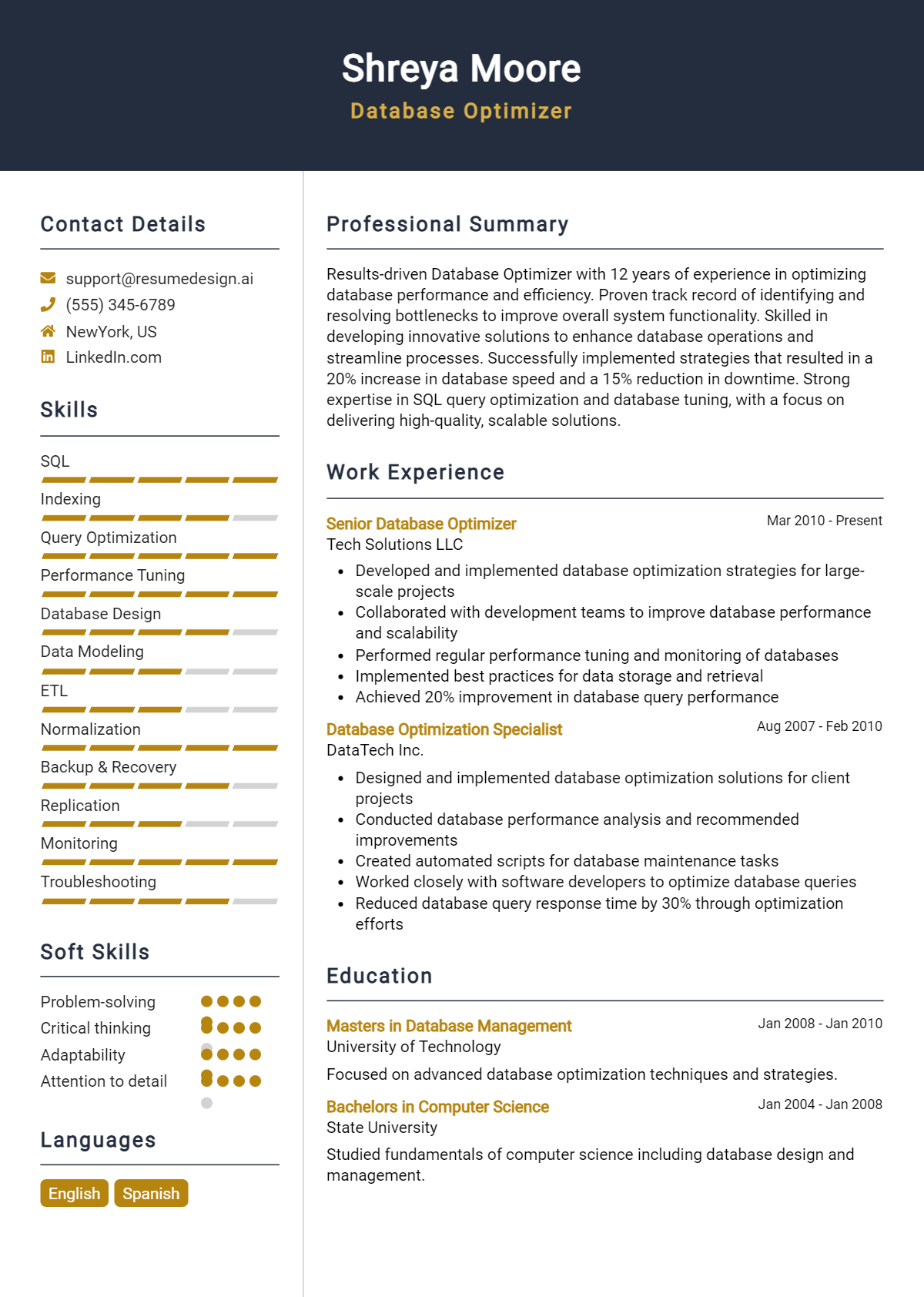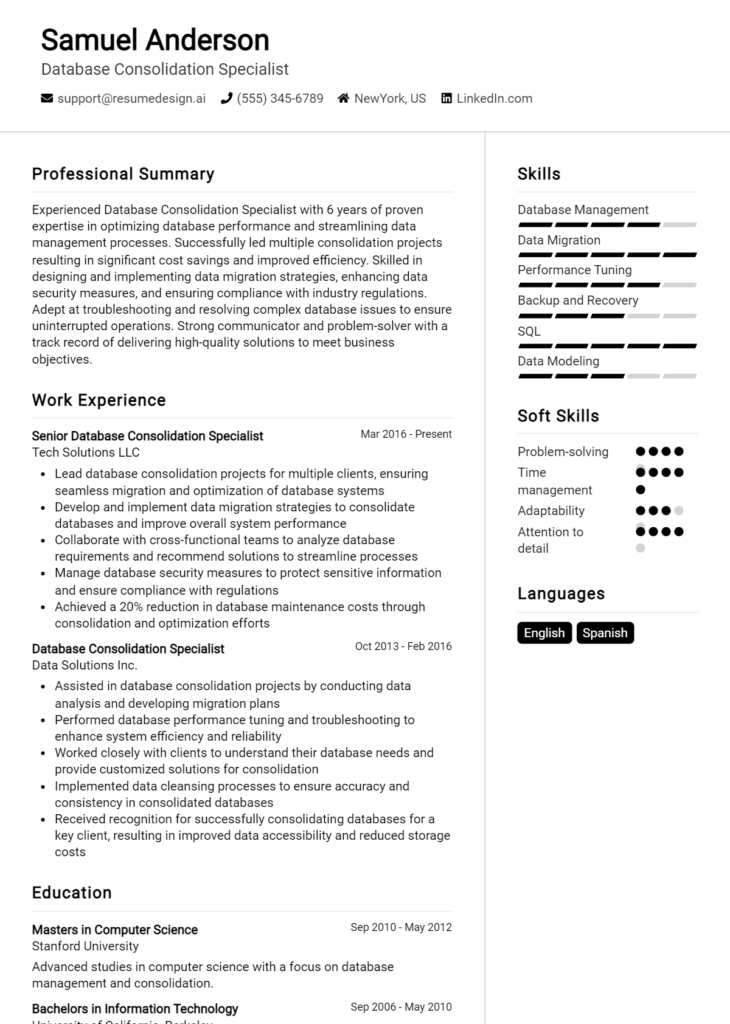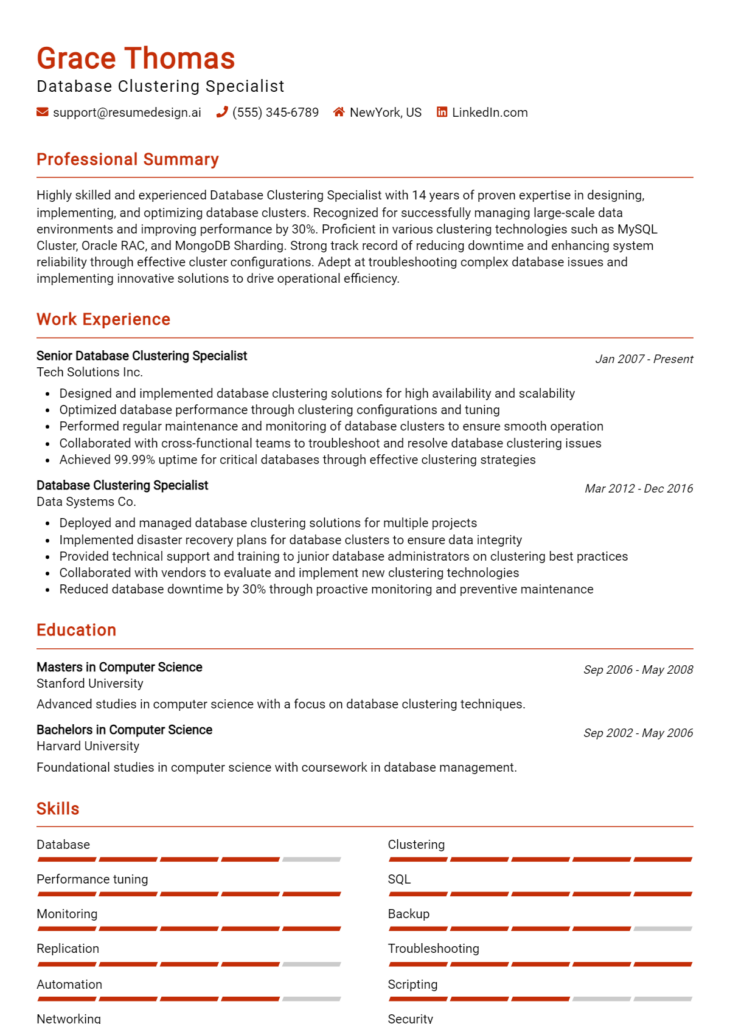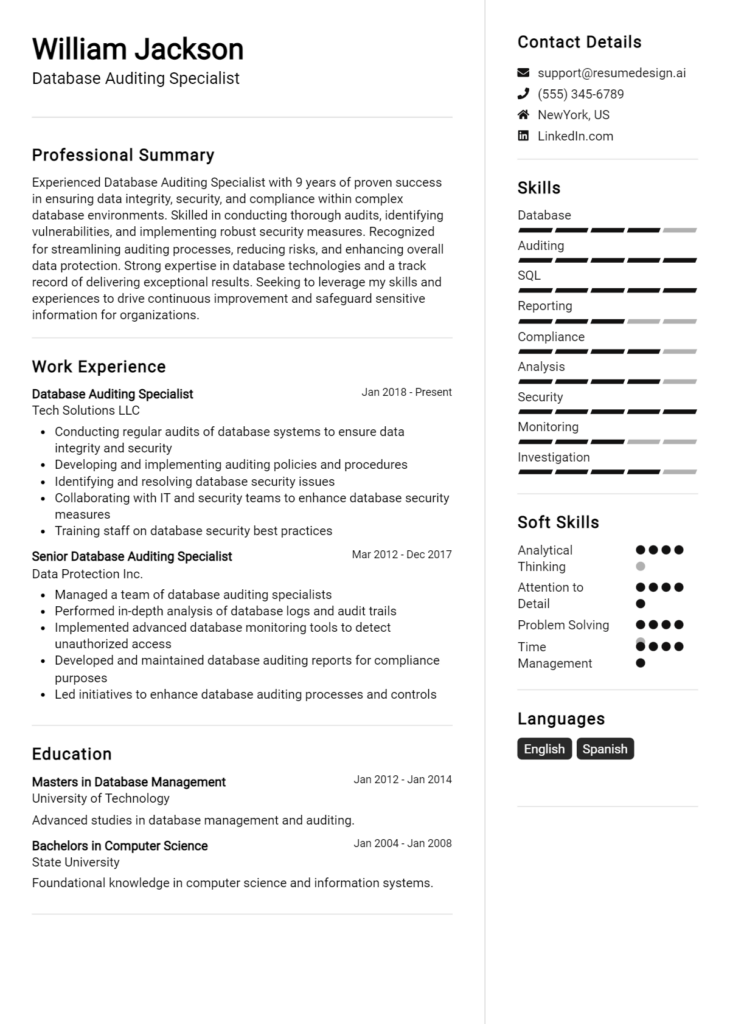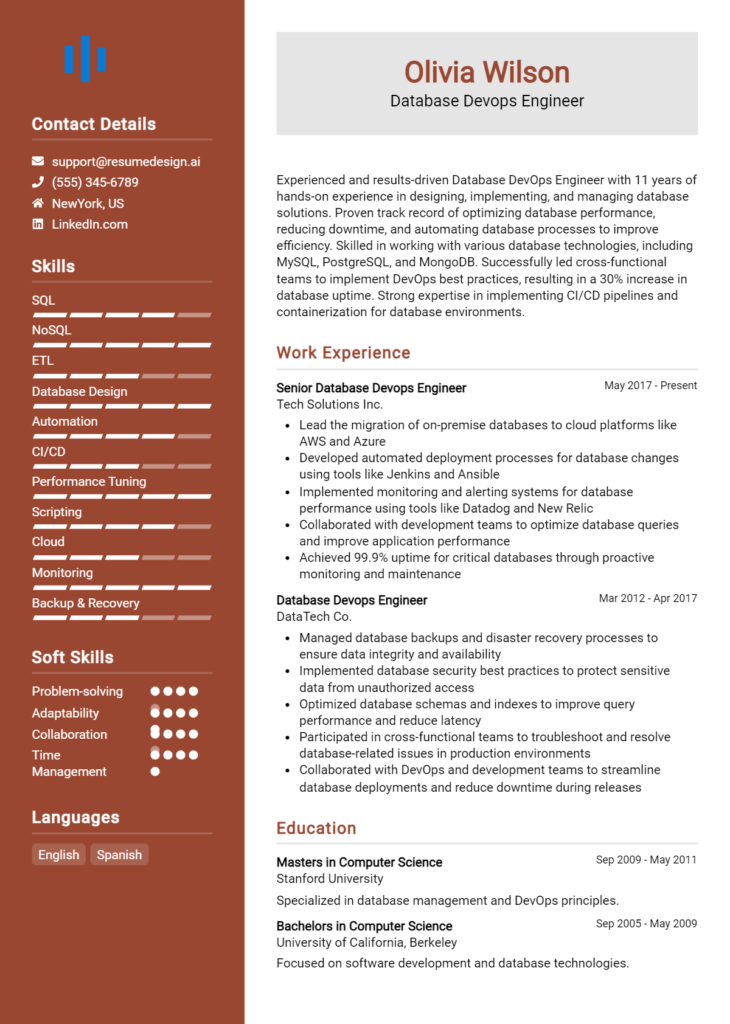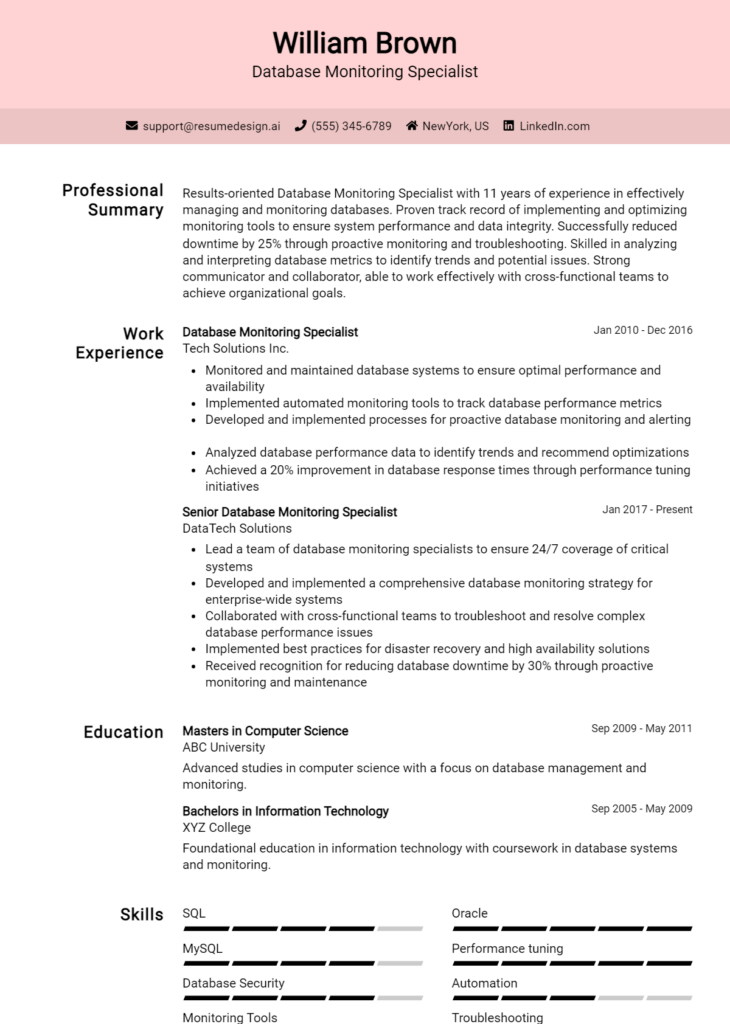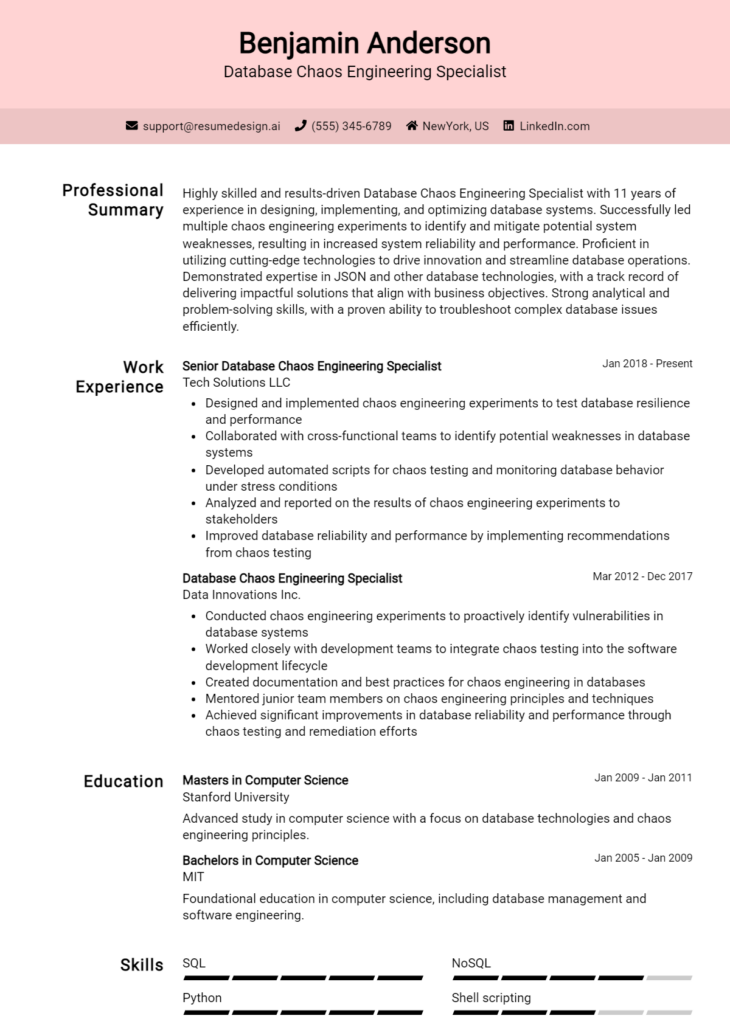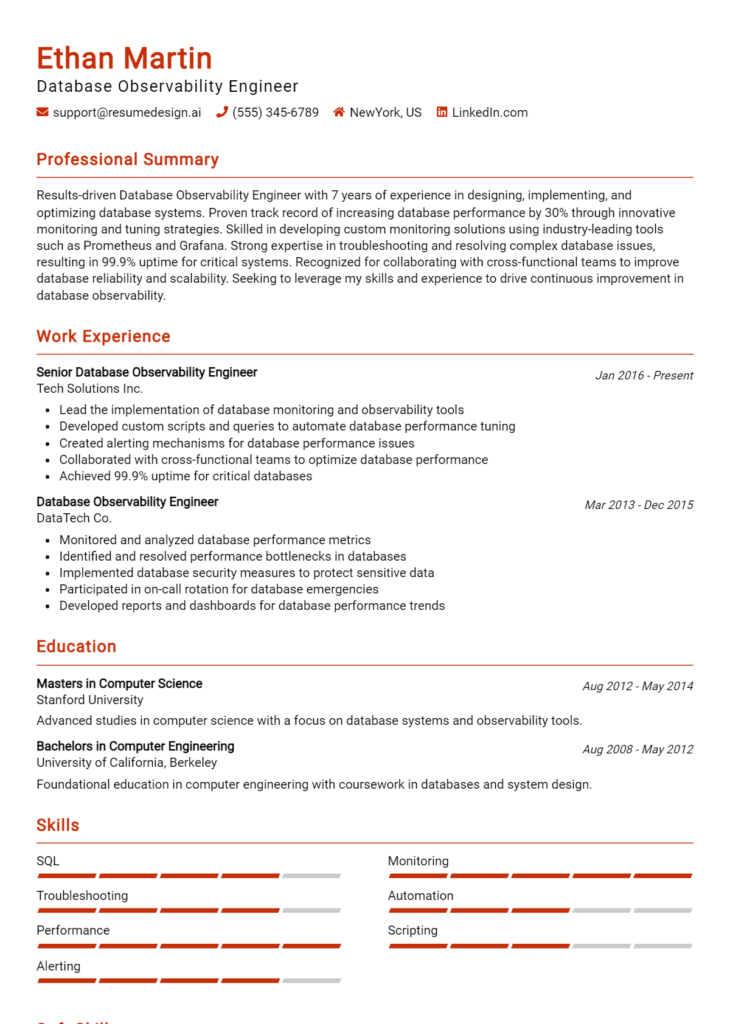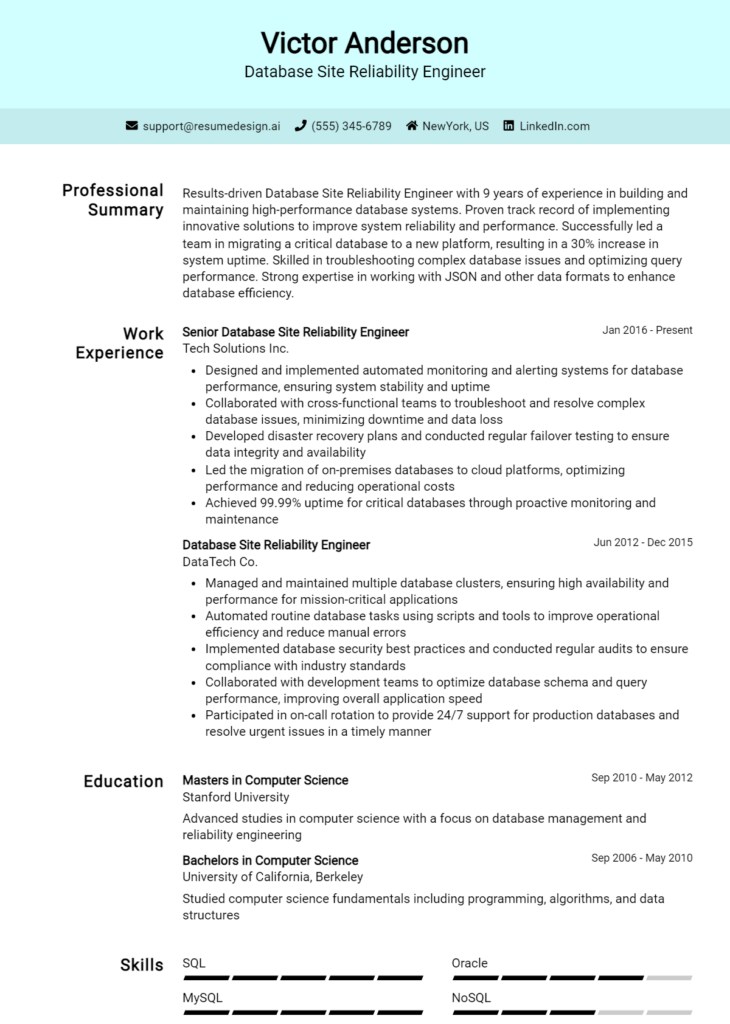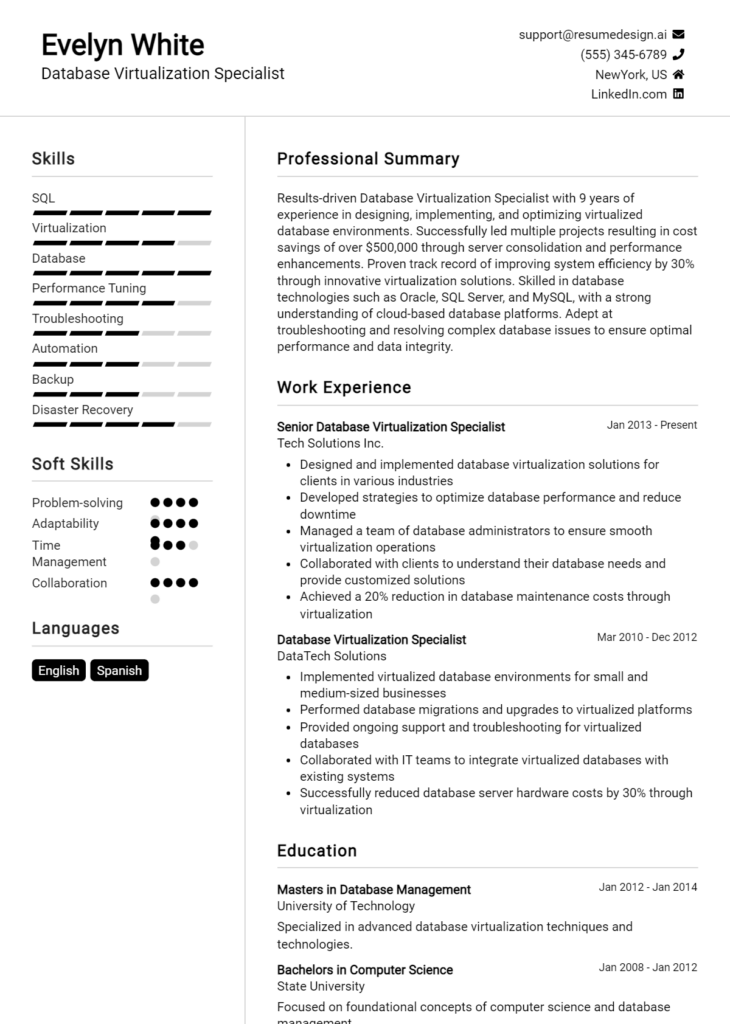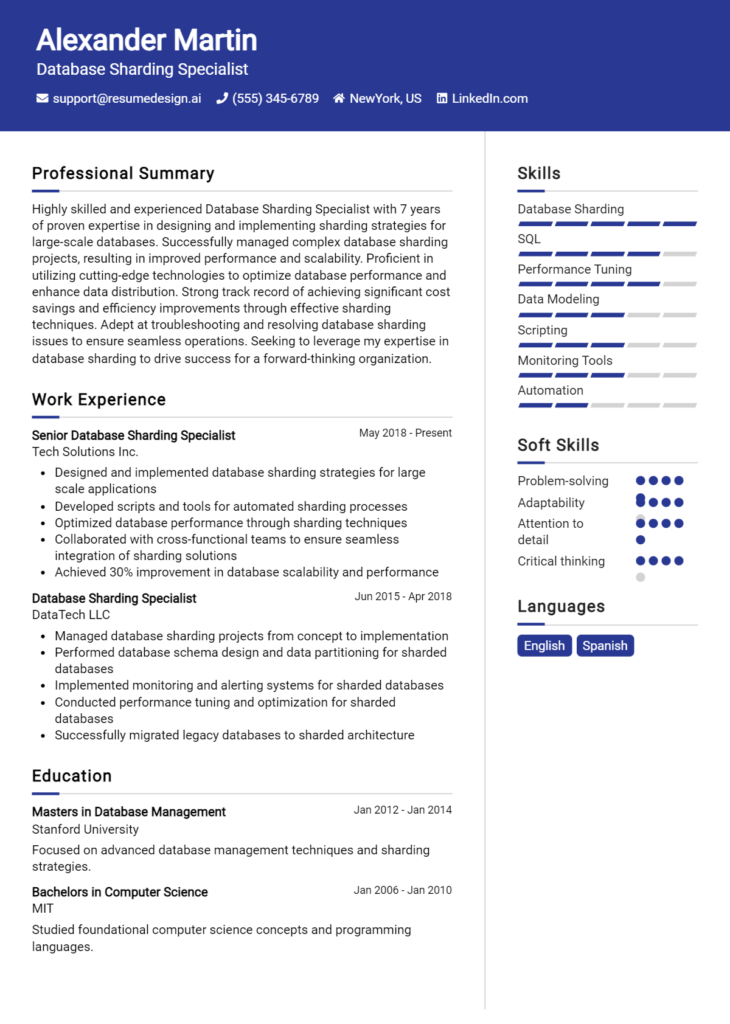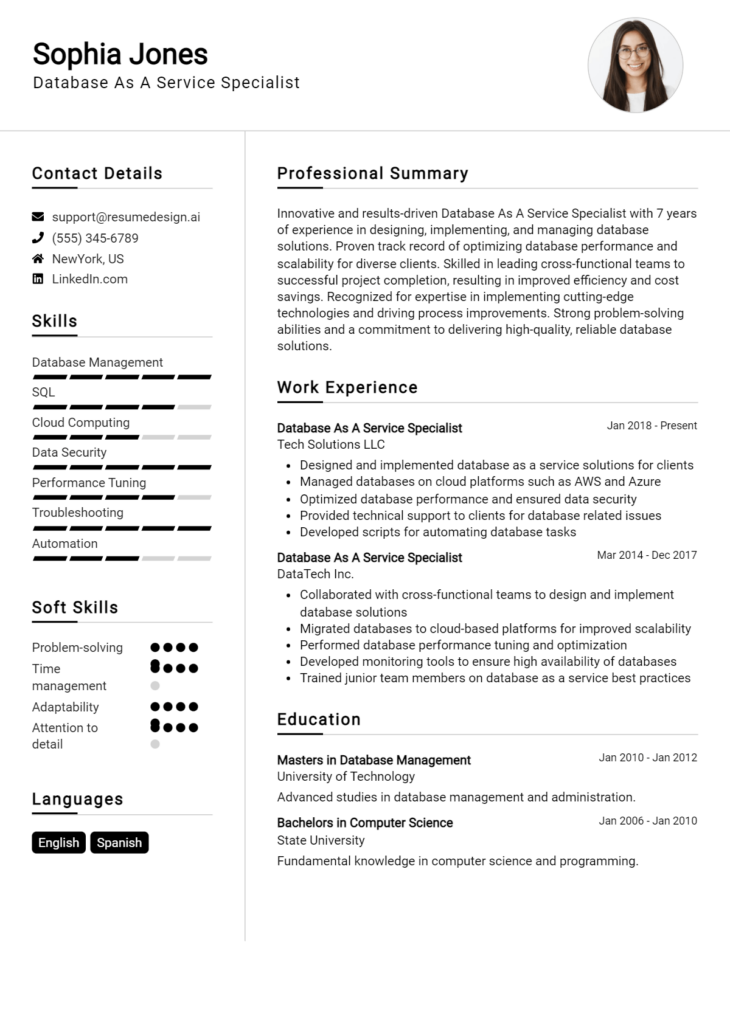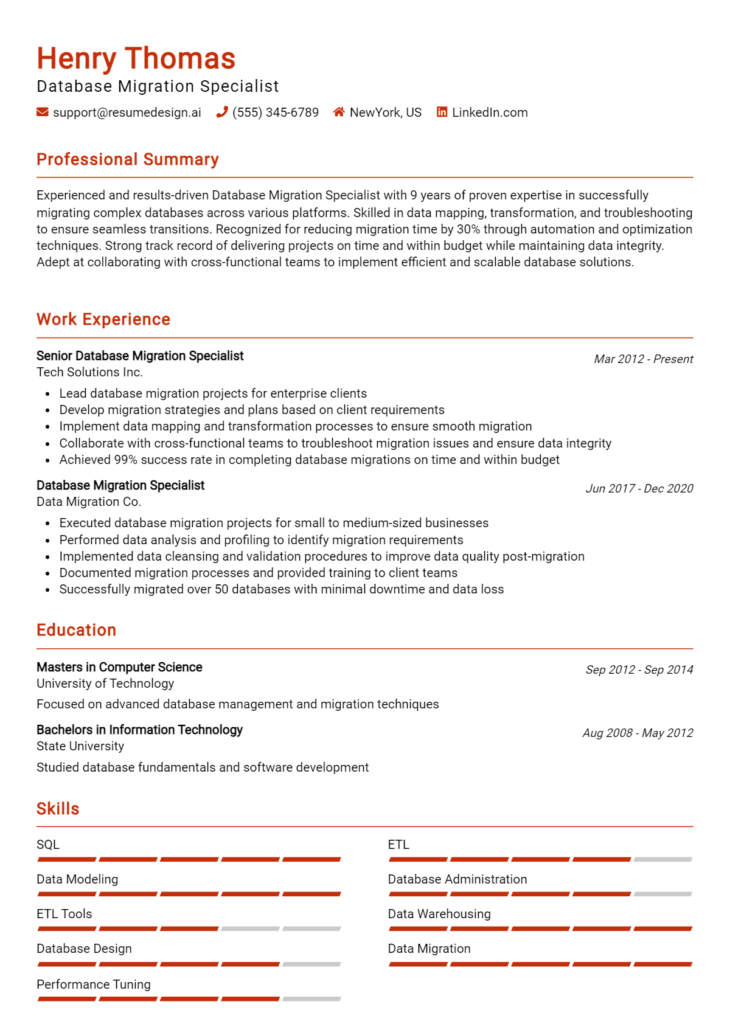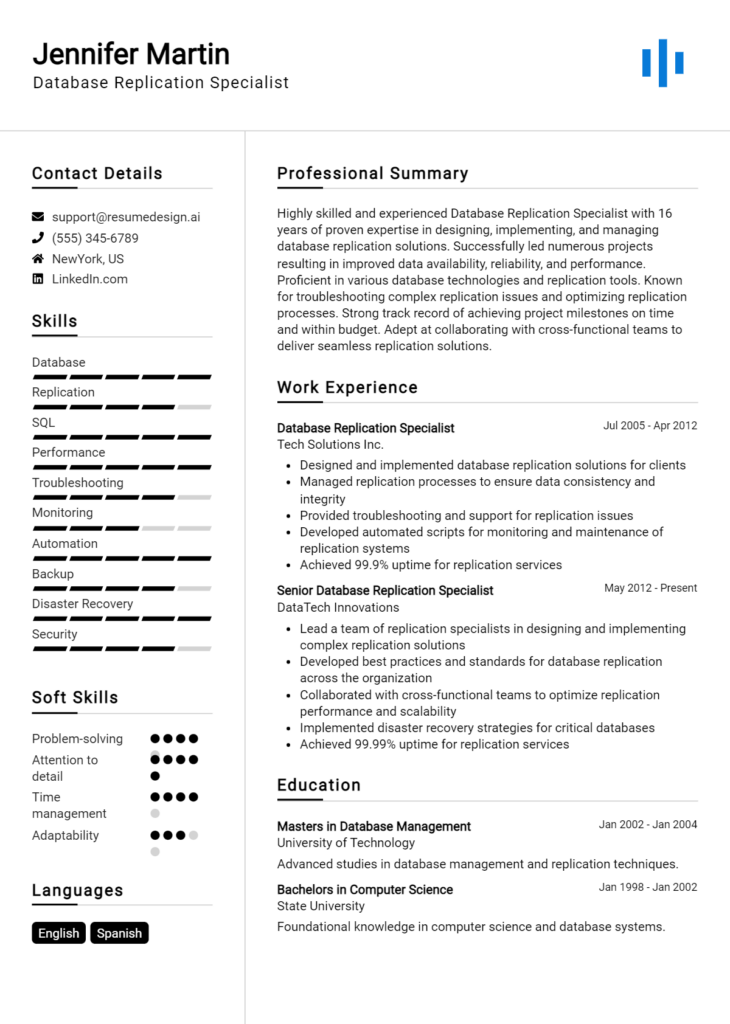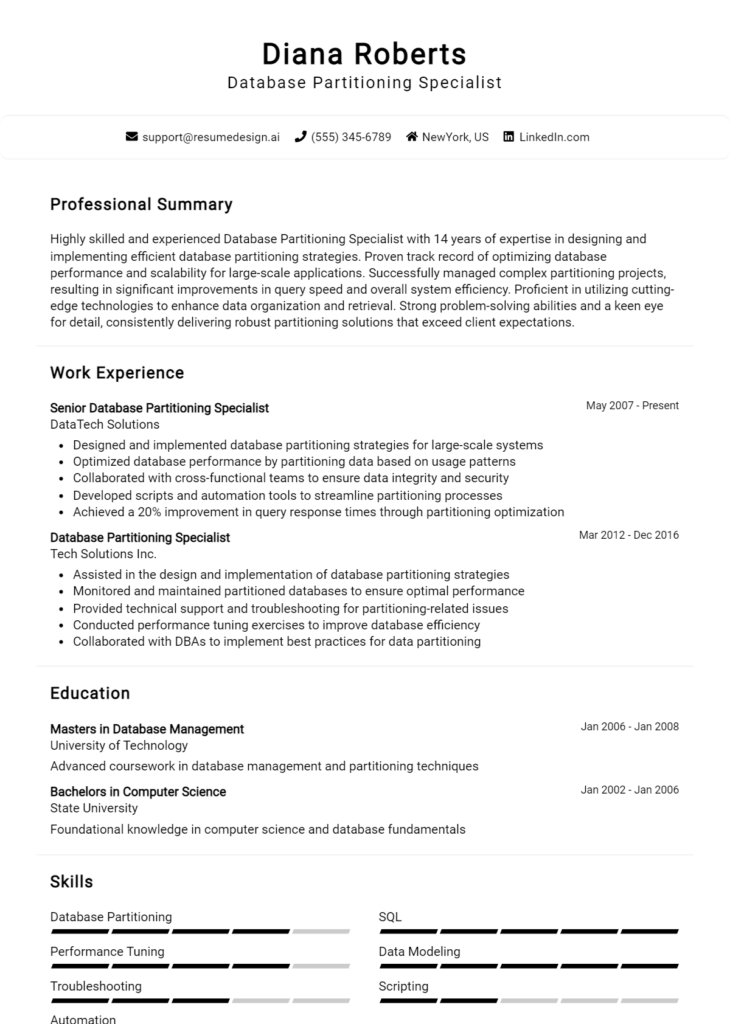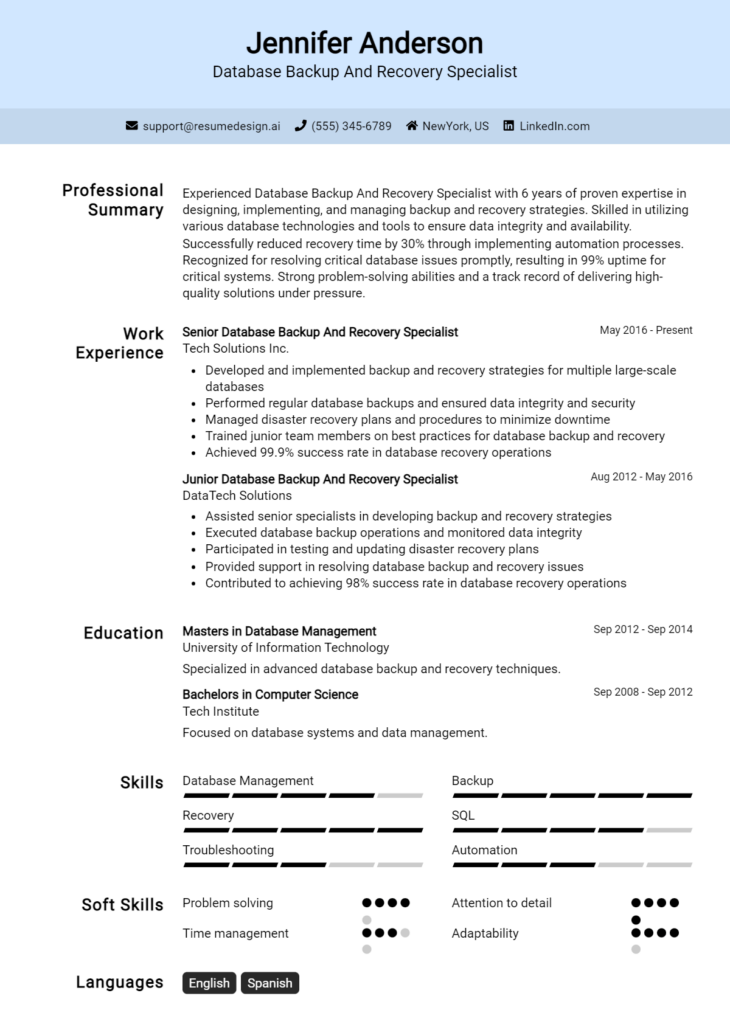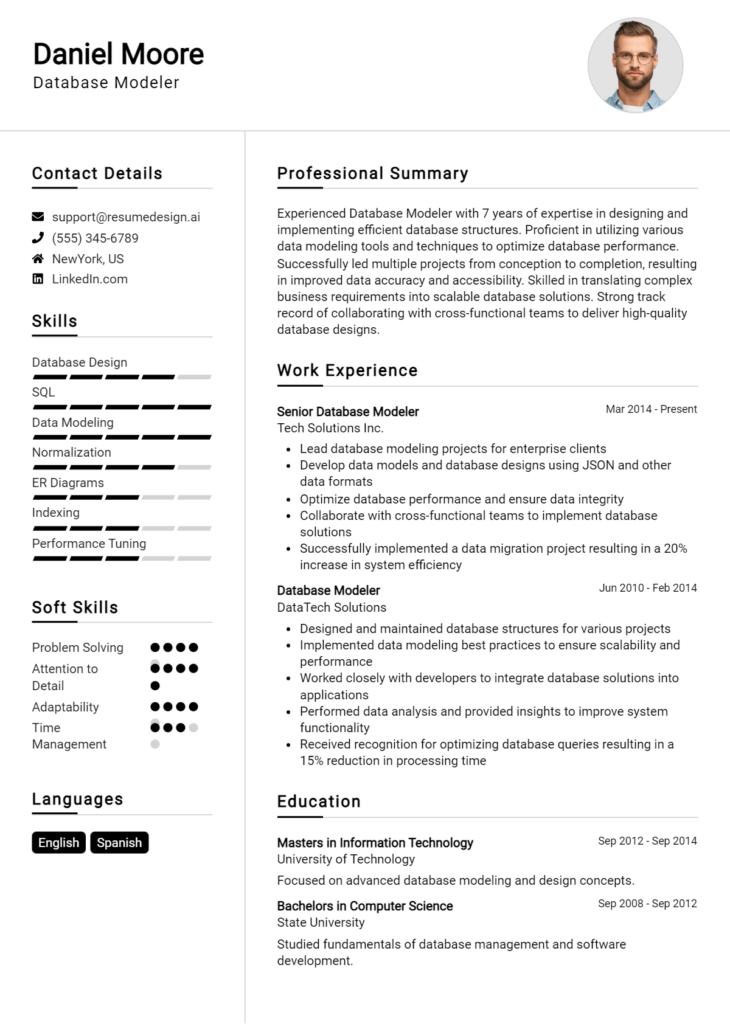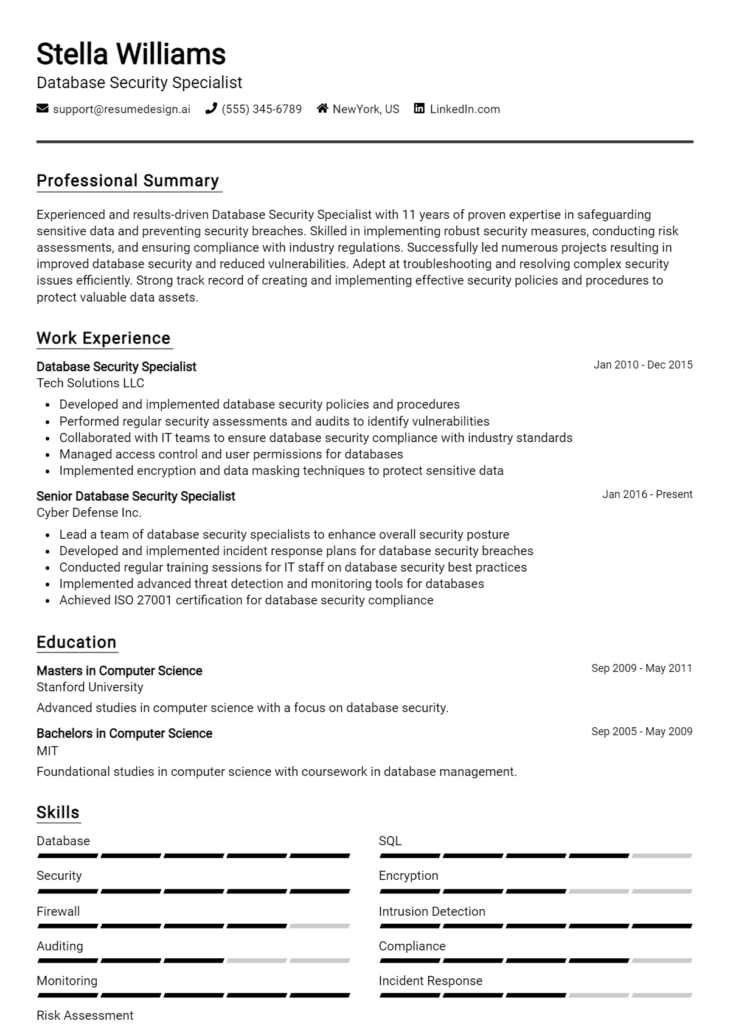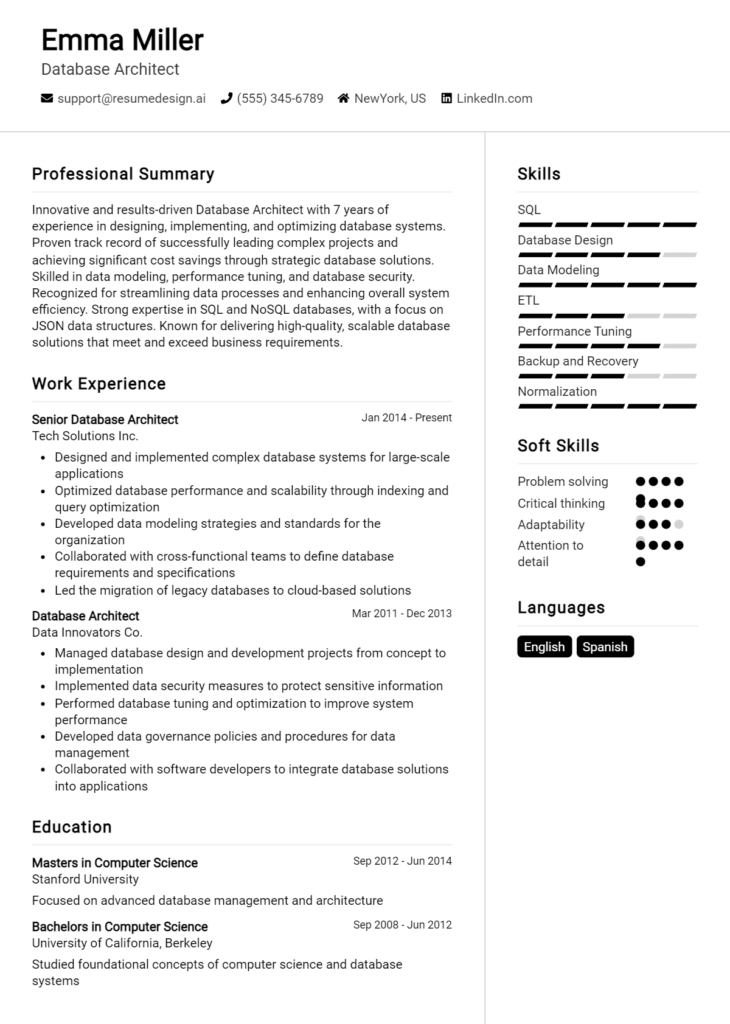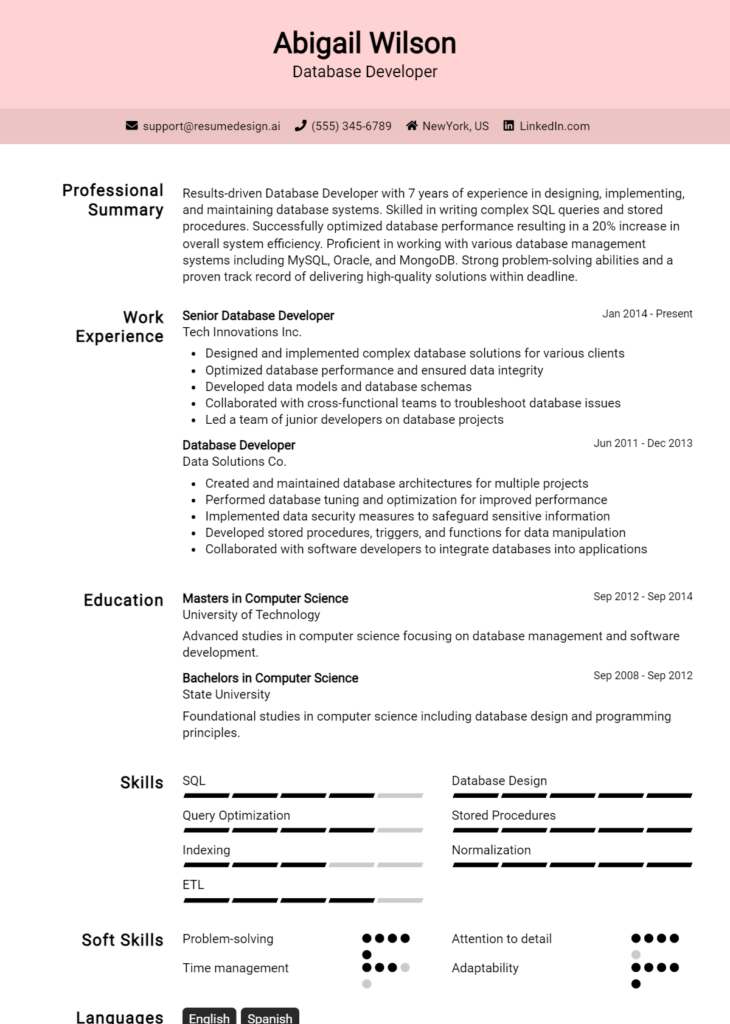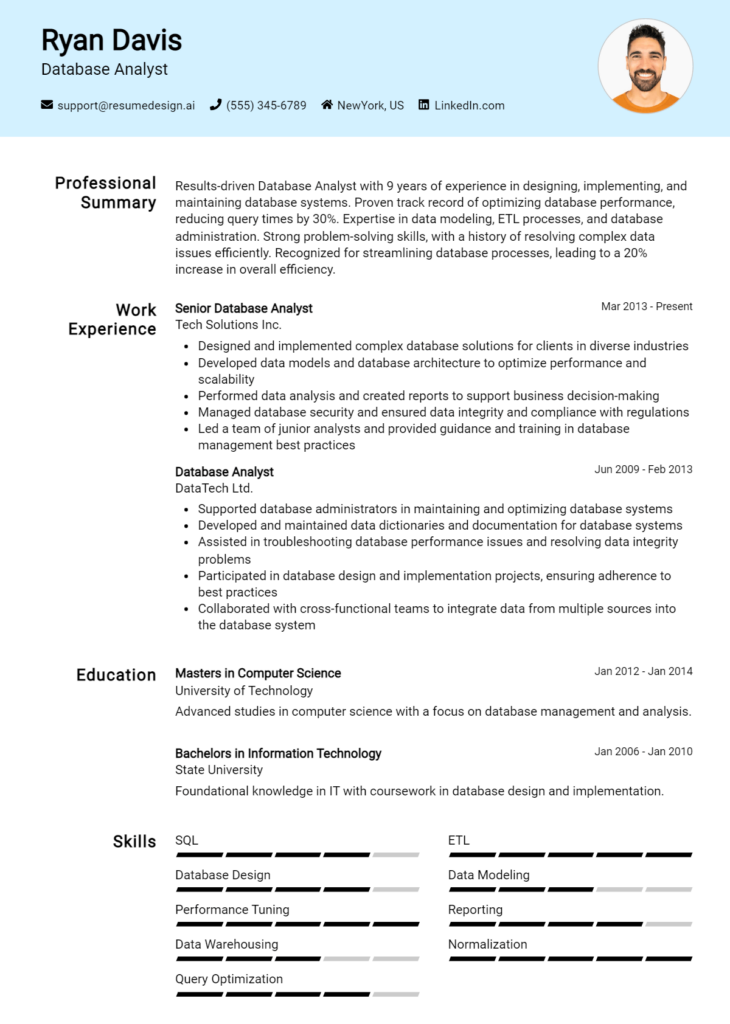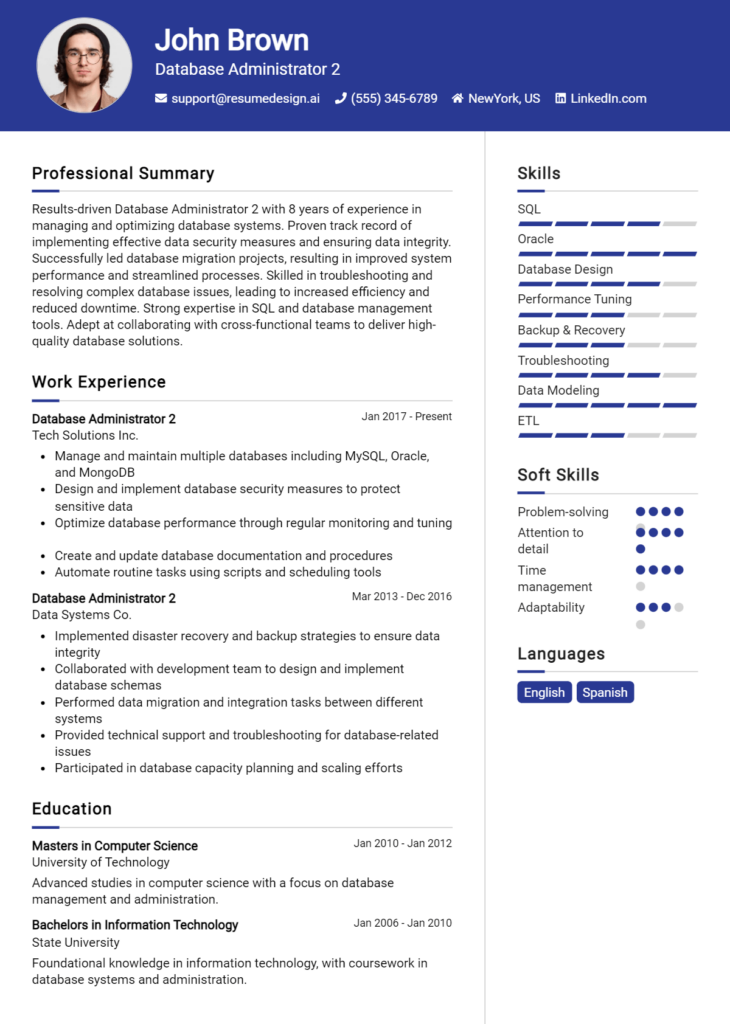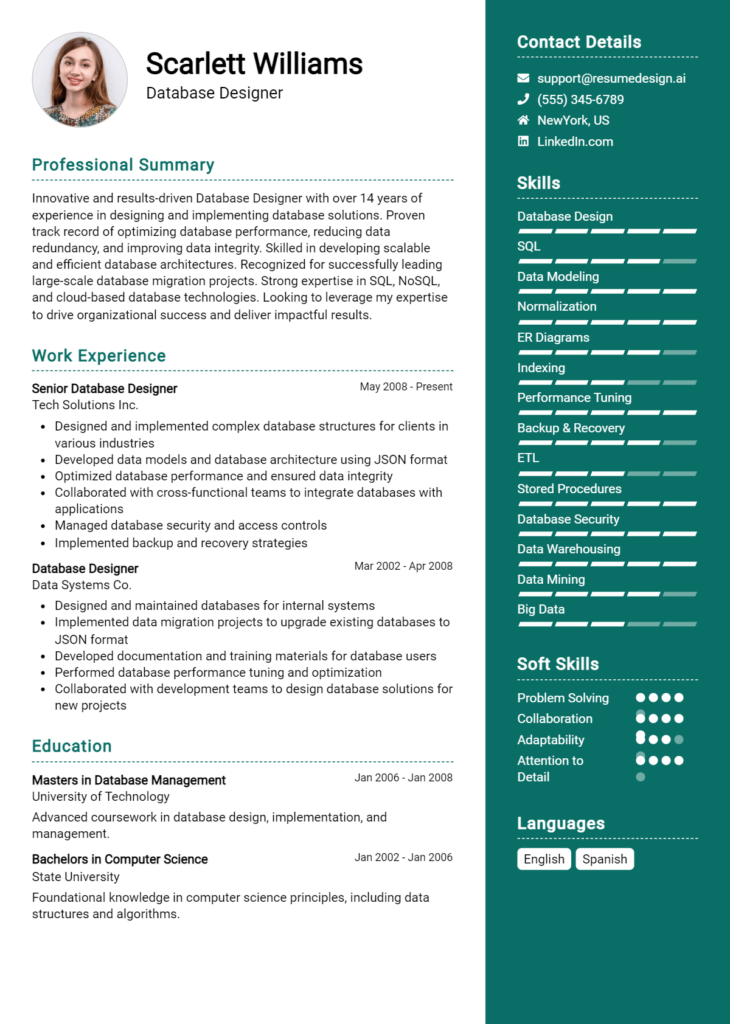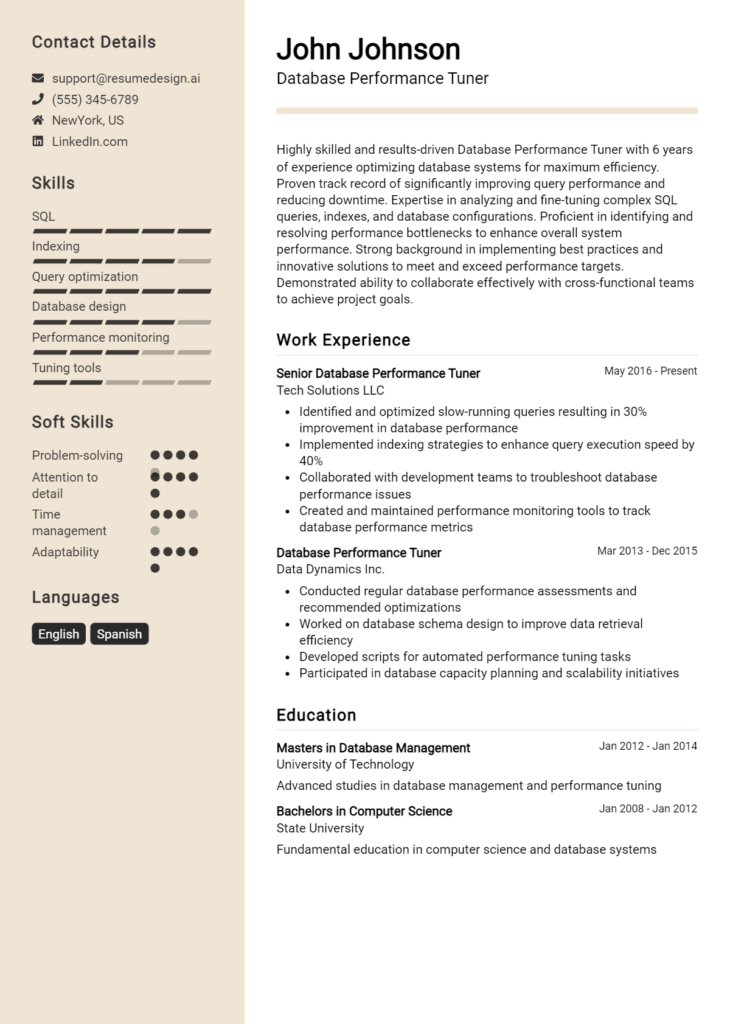Database Optimizer Core Responsibilities
A Database Optimizer plays a crucial role in enhancing the performance and efficiency of database systems, requiring a blend of technical, operational, and problem-solving skills. This professional collaborates with IT, data analytics, and business departments to identify data-related challenges and implement solutions that align with organizational goals. Mastery in SQL, performance tuning, and data architecture is essential, as is the ability to communicate technical concepts across functions. A well-structured resume can effectively highlight these qualifications, showcasing the candidate's ability to drive data optimization initiatives.
Common Responsibilities Listed on Database Optimizer Resume
- Assessing and analyzing database performance metrics
- Implementing performance tuning and optimization techniques
- Collaborating with cross-functional teams to gather requirements
- Developing and maintaining database documentation
- Identifying and resolving data integrity issues
- Monitoring database security and access controls
- Designing and executing backup and recovery strategies
- Testing and implementing database upgrades and migrations
- Creating and optimizing SQL queries and stored procedures
- Providing training and support to end-users
- Staying updated on industry trends and emerging technologies
High-Level Resume Tips for Database Optimizer Professionals
A well-crafted resume is crucial for Database Optimizer professionals, serving as the first impression a candidate makes on potential employers. In a field where precision and analytical skills are paramount, your resume needs to reflect not only your technical expertise but also your achievements in optimizing database performance. It's essential to convey your value in a clear and compelling manner, as employers often sift through numerous applications before identifying the standout candidates. This guide will provide practical and actionable resume tips specifically tailored for Database Optimizer professionals, ensuring that your resume effectively showcases your skills and experiences.
Top Resume Tips for Database Optimizer Professionals
- Tailor your resume to each job description by incorporating relevant keywords that reflect the skills and experiences mentioned in the posting.
- Highlight your experience with various database management systems (DBMS) such as MySQL, PostgreSQL, Oracle, or SQL Server, emphasizing your proficiency in each.
- Quantify your achievements by including specific metrics, such as percentage improvements in query performance or reductions in load times, to demonstrate your impact.
- Include relevant certifications, such as Microsoft Certified: Azure Database Administrator Associate or Oracle Certified Professional, to validate your expertise.
- Showcase your problem-solving skills by detailing specific challenges you faced in previous roles and the solutions you implemented.
- Emphasize your familiarity with performance tuning methodologies and tools, such as indexing strategies and query optimization techniques.
- Incorporate examples of collaboration with cross-functional teams, as database optimizers often work alongside developers and system administrators.
- Use clear and concise language to describe your responsibilities and achievements, making it easy for hiring managers to quickly grasp your qualifications.
- Keep your resume to one or two pages in length, focusing on the most relevant and recent experiences to maintain the reader's attention.
Implementing these tips can significantly increase your chances of landing a job in the Database Optimizer field. By crafting a targeted and achievement-oriented resume, you'll not only capture the attention of hiring managers but also demonstrate your qualifications and readiness to optimize complex database systems effectively.
Why Resume Headlines & Titles are Important for Database Optimizer
In the competitive field of database optimization, a well-crafted resume headline or title plays a crucial role in capturing the attention of hiring managers. A strong headline can serve as the first impression, summarizing a candidate's key qualifications and unique value proposition in an impactful and concise manner. It should be directly relevant to the job being applied for, as it sets the tone for the rest of the resume and encourages the reader to delve deeper into the candidate's skills and experiences. By effectively highlighting expertise in database optimization, these headlines can differentiate a candidate from others in the pool, making them more memorable and appealing to potential employers.
Best Practices for Crafting Resume Headlines for Database Optimizer
- Keep it concise – Aim for 5-10 words that encapsulate your expertise.
- Be specific – Use terminology and keywords relevant to database optimization.
- Highlight key skills – Focus on your most significant skills and accomplishments.
- Include metrics – If applicable, incorporate quantifiable achievements to demonstrate impact.
- Use action-oriented language – Begin with strong verbs that convey proactivity.
- Tailor to the job description – Align your headline with the requirements of the position.
- Showcase certifications – If you have relevant certifications, mention them in the title.
- Avoid clichés – Steer clear of overused phrases that do not add value.
Example Resume Headlines for Database Optimizer
Strong Resume Headlines
"Results-Driven Database Optimizer with 10+ Years of Experience in Performance Tuning"
“Certified Database Administrator Specializing in Scalability and Optimization Techniques”
“Expert Database Optimizer: Proven Track Record of Reducing Query Times by 40%”
Weak Resume Headlines
“Database Expert Looking for New Opportunities”
“Professional with Database Skills”
The strong headlines are effective because they provide specific insights into the candidate's experience, skills, and accomplishments, making them stand out to hiring managers. They convey a sense of expertise and professionalism, enhancing the candidate's appeal. In contrast, the weak headlines fail to impress due to their vagueness and lack of concrete information. They do not communicate unique qualifications or indicate any particular strengths, which makes it difficult for hiring managers to see the candidate's value at a glance.
Writing an Exceptional Database Optimizer Resume Summary
A well-crafted resume summary is crucial for a Database Optimizer as it serves as the first impression a candidate makes on hiring managers. This brief yet impactful section quickly captures attention by highlighting key skills, relevant experience, and notable accomplishments specific to the role of a Database Optimizer. A strong summary not only showcases the candidate's qualifications but also effectively communicates their potential value to the organization. To stand out in a competitive job market, it is essential that the summary be concise, engaging, and tailored to the specific job description being applied for.
Best Practices for Writing a Database Optimizer Resume Summary
- Quantify Achievements: Use numbers and metrics to demonstrate your impact on previous projects.
- Highlight Relevant Skills: Focus on skills that are directly relevant to database optimization, such as performance tuning, query optimization, and indexing strategies.
- Tailor to the Job Description: Adjust your summary to reflect the specific requirements and keywords mentioned in the job posting.
- Showcase Technical Proficiency: Mention specific database technologies and tools you are proficient in, such as SQL, Oracle, or MongoDB.
- Emphasize Problem-Solving Abilities: Illustrate your capacity to diagnose and resolve database performance issues efficiently.
- Keep it Concise: Aim for 3-5 sentences that encapsulate your strengths without overwhelming the reader.
- Use Action Verbs: Start sentences with powerful action verbs to convey your contributions effectively.
- Reflect Professional Growth: Include any relevant certifications or training that enhance your qualifications as a Database Optimizer.
Example Database Optimizer Resume Summaries
Strong Resume Summaries
Results-driven Database Optimizer with over 7 years of experience in enhancing database performance, leading to a 30% reduction in query response time. Proficient in SQL Server and PostgreSQL, I have successfully implemented indexing strategies that improved data retrieval efficiency by 50%.
Accomplished Database Administrator specializing in performance tuning and optimization. Reduced operational costs by 20% through comprehensive analysis and refactoring of complex SQL queries. Adept at leveraging advanced database tools to enhance system reliability.
Detail-oriented Database Optimizer with a proven track record of optimizing large-scale SQL databases. Achieved a 40% increase in data processing speeds while implementing best practices in database design and management. Certified in Oracle Database Performance Tuning.
Weak Resume Summaries
Database professional looking for opportunities to improve database performance. Experienced in working with databases and solving problems.
Skilled in database management and optimization. Have worked on various projects, hoping to find a role that utilizes my skills.
The strong resume summaries are effective because they provide specific achievements, quantifiable results, and relevant skills that align directly with the role of a Database Optimizer. They demonstrate the candidate's value and expertise in a clear and compelling manner. In contrast, the weak summaries lack specificity, do not highlight measurable outcomes, and come across as generic, making it difficult for hiring managers to see the candidate's unique qualifications or potential contributions to the organization.
Work Experience Section for Database Optimizer Resume
The work experience section of a Database Optimizer resume is critical as it serves as a detailed showcase of the candidate's technical skills, ability to manage teams, and their track record of delivering high-quality products. This section allows hiring managers to assess not only the candidate's relevant experience but also how effectively they can leverage their expertise to optimize database performance and drive organizational success. By quantifying achievements and aligning experiences with industry standards, candidates can demonstrate their impact in previous roles, making a compelling case for their candidacy.
Best Practices for Database Optimizer Work Experience
- Clearly highlight technical skills relevant to database optimization, such as SQL tuning, indexing strategies, and performance monitoring tools.
- Quantify achievements where possible, using metrics like percentage improvements in query response time or reductions in system downtime.
- Emphasize collaborative experiences, showcasing teamwork with developers, system architects, or cross-functional teams to improve database performance.
- Use action verbs to describe contributions and responsibilities, focusing on results-driven language.
- Align work experience with industry standards and best practices, showing familiarity with current tools and methodologies.
- Include certifications or training relevant to database optimization to enhance credibility.
- Tailor the work experience section to each job application, highlighting the most relevant experiences for the position.
- Maintain a clear and concise format for easy readability, ensuring key points stand out.
Example Work Experiences for Database Optimizer
Strong Experiences
- Led a team of 5 database administrators to optimize a high-traffic e-commerce platform, resulting in a 40% reduction in query response times and a 30% increase in customer satisfaction ratings.
- Implemented an automated indexing strategy that improved database performance by 50%, decreasing page load times from 5 seconds to 2.5 seconds.
- Collaborated with software engineers to redesign the database architecture, which resulted in a 25% reduction in operational costs and improved scalability for future growth.
- Managed a successful migration of a legacy database system to a cloud-based solution, enhancing data accessibility and reliability while cutting maintenance costs by 20%.
Weak Experiences
- Worked on various database tasks without specific outcomes or measurable results.
- Assisted in database optimization but did not specify the impact on performance or efficiency.
- Participated in team meetings related to database performance improvements, but lacked any detail about contributions or outcomes.
- Handled database issues as they arose but did not provide context on the scale or significance of these issues.
The examples provided highlight the importance of specificity and quantifiable achievements in the work experience section. Strong experiences demonstrate clear outcomes and leadership roles, showcasing the candidate's impact on database optimization efforts. In contrast, weak experiences lack detail and measurable results, making it difficult for hiring managers to gauge the candidate's effectiveness and technical prowess in optimizing database performance.
Education and Certifications Section for Database Optimizer Resume
The education and certifications section of a Database Optimizer resume is crucial as it provides a snapshot of the candidate's academic qualifications and professional development related to database management and optimization. This section not only showcases the candidate's formal education but also emphasizes their commitment to continuous learning through industry-relevant certifications and specialized training programs. By including pertinent coursework and recognized credentials, candidates can significantly enhance their credibility, demonstrating a strong alignment with the job role and showcasing their readiness to tackle the challenges of database optimization in modern environments.
Best Practices for Database Optimizer Education and Certifications
- Focus on relevant degrees, such as Computer Science, Information Technology, or Database Management.
- Include industry-recognized certifications like Microsoft Certified: Azure Database Administrator Associate or Oracle Certified Professional.
- Highlight specialized training related to database optimization tools and techniques.
- Provide detailed coursework that directly relates to database systems, data structures, and performance tuning.
- Showcase any online courses or boot camps that enhance specific skills relevant to database optimization.
- Emphasize continuous learning efforts through workshops, webinars, and professional development courses.
- Ensure that all listed credentials are current and valid, avoiding outdated certifications.
- Consider including GPA or honors if they are particularly impressive and relevant to the role.
Example Education and Certifications for Database Optimizer
Strong Examples
- Bachelor of Science in Computer Science, University of Technology, 2022.
- Oracle Certified Professional, Database 19c Administrator, 2023.
- Data Management and Analytics Certificate, Coursera, 2021.
- Advanced SQL for Data Scientists, EdX, 2022.
Weak Examples
- Bachelor of Arts in English Literature, University of Arts, 2019.
- Certification in Microsoft Office, 2018.
- High School Diploma, 2015.
- Outdated Cisco Certified Network Associate (CCNA), 2016.
The strong examples are considered relevant and impactful as they directly relate to database optimization, showcasing both formal education in computer science and current industry certifications. In contrast, the weak examples are deemed ineffective due to their lack of relevance to the database field, outdated credentials, or qualifications that do not align with the requirements of a Database Optimizer role. These distinctions underscore the importance of tailoring the education and certifications section to reflect the skills and knowledge pertinent to the position.
Top Skills & Keywords for Database Optimizer Resume
In the competitive field of database management, a well-crafted resume for a Database Optimizer is crucial in showcasing your expertise and qualifications. Skills play a pivotal role in this process, as they demonstrate your ability to enhance database performance, streamline queries, and ensure efficient data management. Highlighting the right combination of soft and hard skills can set you apart from other candidates, making it essential to curate a resume that effectively reflects your competencies. Potential employers are not only interested in your technical know-how but also in how you communicate and collaborate within a team. Thus, a balanced presentation of skills can significantly enhance your chances of landing an interview.
Top Hard & Soft Skills for Database Optimizer
Soft Skills
- Analytical Thinking
- Problem-Solving
- Attention to Detail
- Communication Skills
- Team Collaboration
- Time Management
- Adaptability
- Critical Thinking
- Project Management
- Creativity
Hard Skills
- SQL Proficiency
- Database Design and Modeling
- Performance Tuning
- Query Optimization
- Data Warehousing
- ETL Processes
- Indexing Strategies
- Backup and Recovery Solutions
- Database Security
- Familiarity with Database Management Systems (e.g., MySQL, Oracle, SQL Server)
- Scripting Languages (e.g., Python, Bash)
- Data Migration Techniques
- Understanding of NoSQL Databases
- Troubleshooting Database Issues
- Knowledge of Cloud Database Solutions
By emphasizing these skills in your resume, along with showcasing relevant work experience, you can create a compelling profile that resonates with potential employers in the field of database optimization.
Stand Out with a Winning Database Optimizer Cover Letter
Dear Hiring Manager,
I am writing to express my enthusiasm for the Database Optimizer position at [Company Name], as advertised on [Job Board/Company Website]. With a strong background in database management and optimization, coupled with my analytical skills and attention to detail, I am confident in my ability to enhance the efficiency and performance of your database systems. My experience includes optimizing database queries, implementing indexing strategies, and performing regular maintenance to ensure high availability and reliability.
In my previous role at [Previous Company Name], I successfully improved the database performance by 30% through a series of optimizations, including query restructuring and implementing best practices for database design. I am proficient in a variety of database management systems, including MySQL, PostgreSQL, and Oracle, which allows me to adapt to the specific needs of your organization. Furthermore, my strong analytical abilities enable me to quickly identify bottlenecks and troubleshoot issues, ensuring that data access is swift and seamless for all users.
Collaboration is key in ensuring the successful optimization of database systems, and I pride myself on my ability to work effectively with cross-functional teams, including developers and system administrators. My communication skills allow me to translate complex technical concepts into understandable terms for non-technical stakeholders, fostering a collaborative environment that leads to innovative solutions. I am excited about the opportunity to bring my expertise to [Company Name] and contribute to your team’s success.
Thank you for considering my application. I look forward to the possibility of discussing how my skills and experiences align with the needs of your team. I am eager to contribute to [Company Name] and help drive the optimization of your database systems to new heights.
Sincerely,
[Your Name]
[Your Contact Information]
Common Mistakes to Avoid in a Database Optimizer Resume
When crafting a resume for a Database Optimizer position, it's crucial to present your skills and experiences in a clear and compelling manner. However, many candidates fall into common pitfalls that can undermine their chances of landing an interview. By being aware of these mistakes, you can enhance your resume and effectively showcase your qualifications. Here are some common mistakes to avoid:
Vague Job Descriptions: Failing to provide specific details about your previous roles can make it hard for employers to understand your contributions. Use quantifiable achievements to describe your responsibilities and outcomes.
Ignoring Relevant Skills: Omitting essential skills such as SQL proficiency, indexing strategies, or performance tuning techniques may lead to your resume being overlooked. Tailor your skills section to match the job description.
Overloading with Technical Jargon: While technical expertise is important, excessive jargon can alienate hiring managers who may not be familiar with niche terms. Strike a balance by explaining complex concepts in simpler terms.
Lack of Keywords: Many companies use applicant tracking systems (ATS) to filter resumes. Not incorporating relevant keywords from the job posting can result in your resume being automatically disqualified.
Unclear Formatting: A cluttered or poorly structured resume can distract from your qualifications. Use clear headings, bullet points, and consistent formatting to improve readability.
Neglecting Soft Skills: Focusing solely on technical skills and neglecting soft skills like teamwork, communication, and problem-solving can be a mistake. Highlight how these skills have contributed to your success in previous roles.
Not Including Certifications: Ignoring relevant certifications, such as Oracle Certified Professional or Microsoft Certified Database Administrator, can diminish your credibility. Include any certifications to bolster your qualifications.
Failure to Tailor Your Resume: Sending out a generic resume for every application can be detrimental. Customize your resume for each position to reflect how your experience aligns with the specific requirements of the job.
Conclusion
In conclusion, optimizing databases is a critical role that requires a blend of technical skills, analytical thinking, and a deep understanding of data management strategies. Key responsibilities typically include identifying inefficiencies, streamlining queries, and ensuring data integrity, all of which contribute to improved system performance and user satisfaction. As the demand for skilled Database Optimizers continues to grow, it is essential to present your qualifications effectively to stand out in a competitive job market.
Now is the perfect time to review your Database Optimizer resume and ensure it highlights your unique skills and experiences. To assist you in this process, consider utilizing available resources such as resume templates, which can provide a polished starting point, or try out a resume builder for a more customized approach. Additionally, you can explore resume examples to gather inspiration and ensure that your resume meets industry standards. Don’t forget the importance of a strong introduction; check out cover letter templates to create a compelling narrative that complements your resume. Take these steps today to enhance your job application and secure that Database Optimizer position you've been aiming for!

